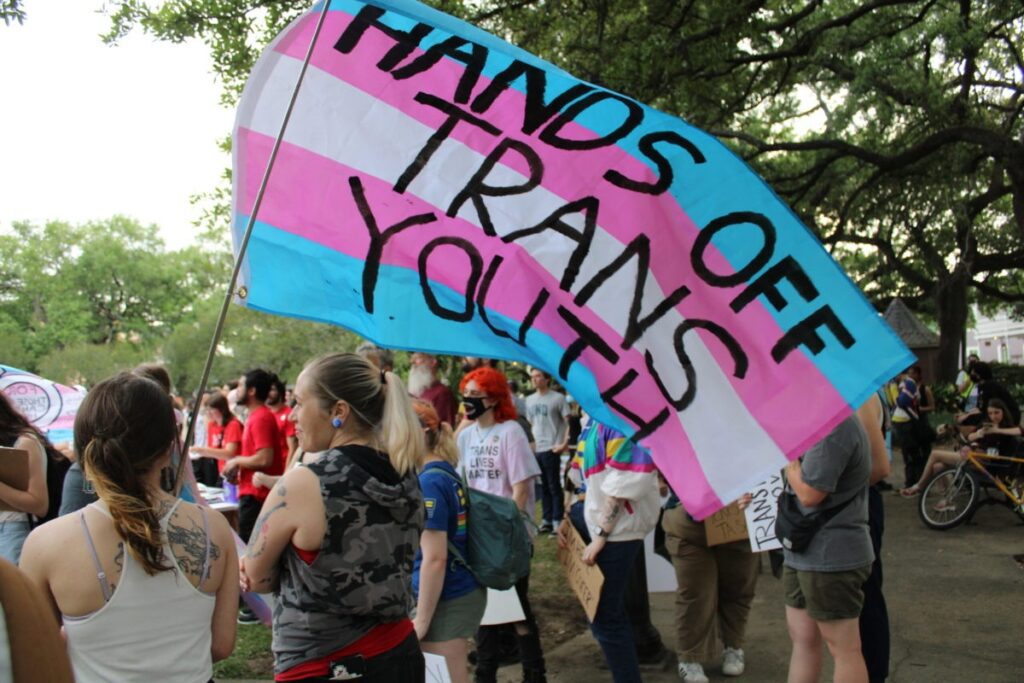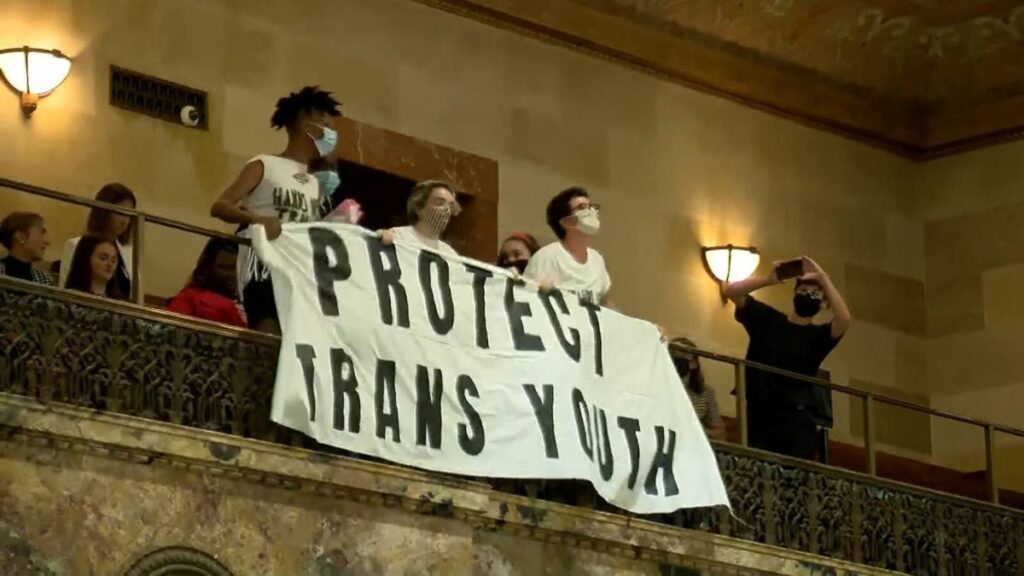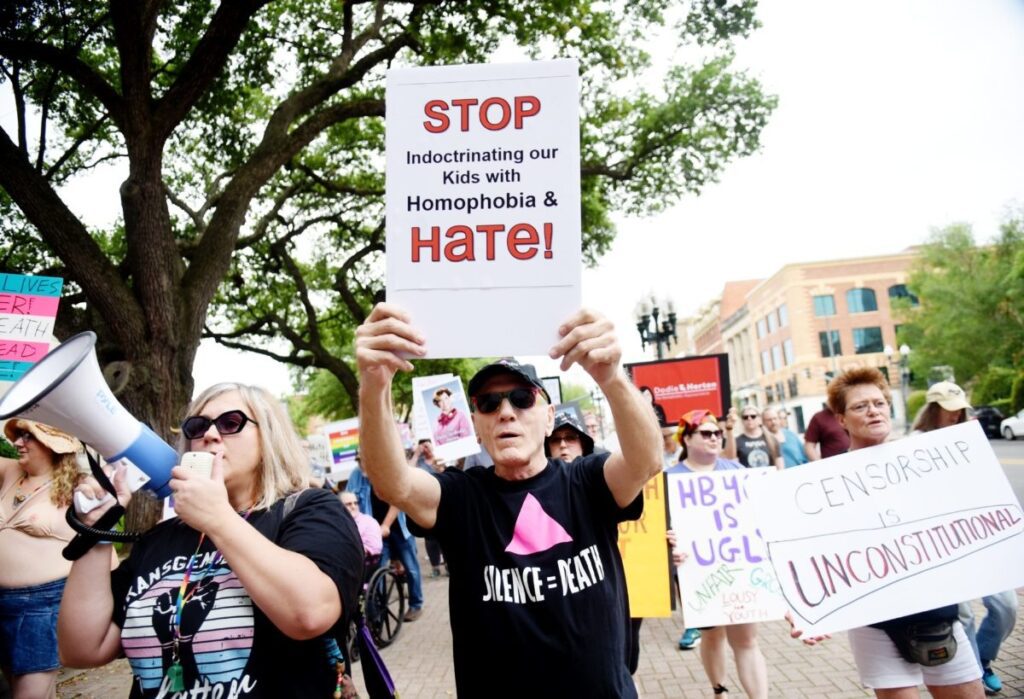Trans youth ‘terrified’ of what Louisiana’s new health care ban will mean
By Roby Chavez
On January 16, 2024

ST. TAMMANY PARISH, La. — For the last two years, Koen has routinely self-administered weekly testosterone injections without a second thought.
During that time, the trans 17-year-old said his self-image and school and family life has drastically improved. His fear of needles, too, has faded.
“[Transitioning] made me look forward to things more because now I can start paying attention to the better version of myself,” said Koen, who asked to be identified by his first name because of fears for his safety. “It’s something I feel like I’ve needed for a while. I’m able to express myself more fluidly and feel comfortable doing that, which I think is a very big step for me right now.”
At the start of the year, though, a greater worry emerged.
A new law banning gender-affirming care for minors in Louisiana took effect on Jan. 1 prohibiting puberty blockers, hormone treatment, and gender-reaffirming surgery. Now, Koen isn’t sure he could continue his hormone treatment.
Louisiana is one of 22 other states that have enacted laws restricting or banning gender-affirming medical care for minors, disrupting health care needs for trans and nonbinary people.
In anticipation of Act 466 going into effect, Koen’s gender-affirming clinic shut down in December. LGBTQ+ advocates and families, like Koen’s, say there’s now a wave of uncertainty because the law is vague for patients as well as providers and pharmacies. The law allows a year for minors under 18 currently receiving medication to be weaned off treatment.
“The whole idea of keeping kids safe is coming from people who are being awful to kids.”
Koen’s family doesn’t have a doctor in the state right now who would provide medical care or write a prescription. He and his parents have had to devise a backup plan if there is an emergency connected to the treatment or if the prescribed medicine is damaged or lost.
LGBTQ+ rights groups say the law does not meet health care standards, and the interpretation of the new measure can vary depending on the medical professional.
As a result, Koen is considering rationing the medicine prescribed by doctors for the next four months until he turns 18 in May.
“I don’t know if they’ll actually be able to keep refilling my meds or the hormones every month. Even though they assured me they can, I don’t know if I should be continuing on my full doses or not,” Koen said. “So, it’s kind of a guessing game.”
The new law is also creating a much more negative atmosphere for trans people, “which puts us in more dangerous situations,” he added. “The whole idea of keeping kids safe is coming from people who are being awful to kids.”

The American Academy of Pediatrics and many other major medical associations support gender-affirming care for trans and gender-diverse youth. Research shows that gender-affirming health care, from using appropriate pronouns to puberty blockers and hormone therapies, leads to decreased suicidal ideation and improved mental health outcomes.
For Koen’s dad, Sean, who also asked to be identified by his first name because of fears for his family’s safety, this new reality means he can’t make decisions about his child’s health care.
It is frustrating, Sean said, that the law got passed in the first place, and “got passed based on fear and misinformation.”
“If we are not able to pick up more medication from the pharmacist, I don’t think we’re going to make it to May, even on a reduced dosage,” he said. “If we had to fly out for a weekend to see a doctor in another state, I don’t know that we could do that.”
Last week, the LGBTQ+ rights group Lambda Legal filed a lawsuit “to stop the harm” on behalf of five trans youth and their families suing Louisiana over the ban. The minors range in age from 9 to 16 years old and are identified in the lawsuit by pseudonyms for privacy and safety concerns. The suit says the law prohibits “medically necessary and often life-saving care.”
“This health care has allowed me to be happy, healthy, and my true authentic self – the boy I know I am. I am terrified of what the health care ban will do and worry about how my mental health might deteriorate,” plaintiff Max Moe, who is diagnosed with gender dysphoria, said in a statement released by Lambda Legal. Gender dysphoria is the discomfort or distress that occurs when someone’s gender identity doesn’t align with their assigned sex. Not all trans people experience gender dysphoria.
Last week, the LGBTQ+ rights group Lambda Legal filed a lawsuit “to stop the harm” on behalf of five trans youth and their families suing Louisiana over the ban. The minors range in age from 9 to 16 years old and are identified in the lawsuit by pseudonyms for privacy and safety concerns. The suit says the law prohibits “medically necessary and often life-saving care.”
“This health care has allowed me to be happy, healthy, and my true authentic self – the boy I know I am. I am terrified of what the health care ban will do and worry about how my mental health might deteriorate,” plaintiff Max Moe, who is diagnosed with gender dysphoria, said in a statement released by Lambda Legal. Gender dysphoria is the discomfort or distress that occurs when someone’s gender identity doesn’t align with their assigned sex. Not all trans people experience gender dysphoria.
Dr. Meredithe McNamara, an assistant professor of pediatrics at Yale School of Medicine, joins the NewsHour’s Geoff Bennett to discuss common myths about gender-affirming medical care for youth.
Supporters of the ban include new Republican Gov. Jeff Landry, the former state attorney general. Last summer, he said the law was “protecting youth from irreversible, life-altering procedures before they’re old enough to make educated decisions.” He also tweeted, “Pediatric sex changes should have no place in our society.”
Opponents of the new law say the campaign for the ban was fueled by misinformation and swarmed with religious arguments, and also overstates the prevalence of some of these treatments. A 2023 Louisiana Department of Health study, based on Medicaid-enrolled minors, revealed that from 2017 to 2021, no gender-reaffirming surgeries were conducted on children in the state and just a few dozen minors received gender transition care annually.
State lawmakers commissioned the study in 2022, and those both in support and against gender-affirming care invoked its results for discussion around the health care ban. The study only accounts for those under Medicaid who receive this care and not patients in other health care systems or with different insurance carriers.
Of the nearly 800,000 children enrolled in Medicaid in the state, 465 were diagnosed by a health care provider with gender dysphoria in 2021. Fifty-seven of those children were considered candidates for puberty blockers or hormone replacements, according to the state health department study.
Scrambling for care
Since the legislation was passed last summer, parents have been scrambling for care, abandoning support networks, family, and established care providers, said Omar Gonzalez-Pagan, counsel and health care strategist for Lambda Legal. Louisiana’s new law has nothing to do with protecting the well-being of youth, he added.
“This has everything to do with scapegoating a discreet and vulnerable minority for political gain. It has everything to do with enforcing gender conformity and eradicating LGBTQ people from public spaces,” Gonzalez-Pagan said. “It really forces them to go through the pain and suffering of undergoing physical changes that don’t align with who they are. It endangers our youth, and it gambles as to whether some of them may survive and make it to adulthood.”

There have been legal challenges to the state bans. Some have been temporarily blocked by federal judges. Arkansas’ ban, the nation’s first, was ruled unconstitutional in June, while a judge in Kentucky later lifted his temporary block of the state’s health care ban, allowing it to take effect. Last week, a federal appeals court ruled that Alabama could enforce its ban, while a lawsuit against it proceeds.
Advocates say the impact of Louisiana’s ban was immediate once the state’s Republican-majority legislature voted in July to override the Democratic governor’s veto of the law.
“This law not only endangers their health, it creates a chilling effect on the provision of this care.”
“This law not only endangers their health, it creates a chilling effect on the provision of this care. We have seen how medical providers are leaving Louisiana because of this law,” Gonzalez-Pagan said. “It is forcing families to split apart in order to ensure the health and safety of their kids, and it is forcing people to leave their homes.”
Peyton Rose Michelle, executive director of Louisiana Trans Advocates, said the law wrongly assumes parents and doctors don’t know what’s in the best interest of their children, which has left a lot of confusion and panic.
“We saw doctors shutting down clinics and their operations that provided gender-affirming care months before the deadline because they didn’t know what’s happening. They just read the headlines. They get scared, and they pull back,” said Michelle, a 26-year-old trans woman. “Parents spent the greater half of last year trying to get an appointment with a doctor out of state and traveling out of state. Others were just in full panic. It was already a minefield to navigate and even more mines exist now.”
Ochsner Health, one of the state’s largest hospitals, once touted its Gender Affirmation Clinic and service for minors. Patients and advocates report the clinic is now closed. The clinic’s staff members had testified before lawmakers last summer as the ban was being debated.
Bans across the South
With a majority of Southern U.S. states having a ban, nonprofits have been referring young people and their families to clinics and doctors in states that still offer a wide range of procedures that fall under gender-affirming care.
The waitlist can be long and the trips to access that care can be expensive. A July 2023 report from the Journal of the American Medical Association showed that about 25 percent of youth aged 10 to 17 now live more than four hours one way from the closest clinic that could provide treatments. Before states enacted the restrictions, only 1.4 percent lived this far from a clinic.
The Campaign for Southern Equality has been mapping the changing landscape of gender-affirming care for minors who now face sizable travel barriers.
Families of trans kids know what’s at stake, said the Rev. Jasmine Beach-Ferrara, the campaign’s executive director.
“They have seen their child suffering as a result of not having the care they need and then thriving when they do have the care they need,” she said. “They will put every option on the table, which is what you do when your kid needs help. Our hope and our goal is to just walk alongside families as they figure this out.”
Organizers said someone from Louisiana would need to travel nine to 15 hours to South Carolina, New Mexico, or Kansas to receive care due to bans across the South. The group started supporting families barely a year ago, and it says the need has exploded alongside the record number of anti-trans bills introduced across the nation. Republican-led state legislatures are expected to consider more restrictions to gender-affirming care in the new year — and in some cases, expand them to target access for adults.
In South Carolina, one of the few states in the South that doesn’t have a ban in place, a House committee voted Wednesday to advance a bill that would ban gender-affirming care for minors, as well as bar Medicaid from covering that medical care for people under 25 years old.
The Campaign for Southern Equality now offers assistance to families via a program called the Southern Trans Youth Emergency Project, which launched in response to the swell of anti-trans bills. It operates in 14 states and offers $500 grants per clinic visit. So far, the project has provided $350,000 in emergency grants to the families of trans youth.
Beach-Ferrara said some families are now driving two to three days to get care, and some will take two to four round trips a year to get access to medical care, which come with the financial burden of traveling out of state, time off of work, and missing school. Another group, Elevated Access, provides flights to people who live in places too far to drive.
Families that cannot overcome the cost and time barriers associated with out-of-state travel could face delayed treatments or inability to access care, advocates warn.
Beach-Ferrara said the laws have “triggered overcompliance, meaning that providers are stopping services above and beyond what the law actually requires them to do because of confusion or because of a desire to mitigate any risk whatsoever of being prosecuted under the law.”
“My worry, at a very human level, is that it causes pain and distress for young people and it puts them at elevated risks for the things we know that queer youth and trans youth, in particular, are already at elevated risk for, which include depression, suicidal ideation, and suicide attempts.”
‘The guardrails are off’
LGBTQ+ advocates worry about the possibility of even more anti-trans laws, such as limiting treatment for adults, now that conservative Republicans in the state have a supermajority in both houses of the state legislature and a new Republican governor has replaced Democrat John Bel Edwards.
“We don’t think this wave has crested. We’re very clear-eyed in our assessment of what’s happening and understand that for the extremist groups that are pushing these laws, the guard rails are off,” Beach-Ferrara said. “We need to consider every potential scenario of what they could do next round trying to restrict access for young people and adults.”
Koen’s father, Sean, said the disconnect is alarming for all families facing this new reality.
“It’s hard enough to transition in the first place,” he said, but to stop transitioning when it’s not your choice is “upsetting.”
“I just want to put a warm blanket around my son. That’s my child. I don’t want to see him or others go through those kinds of emotional pains, and I can only imagine what that’s going to feel like if it happens.”
This piece was republished from PBS.